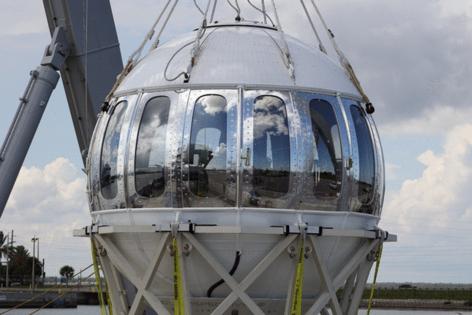Billionaire Richard Branson invests in Space Perspective, to fly on its 1st human space balloon flight
Published in Science & Technology News
ORLANDO, Fla. — Richard Branson already saw the blackness of space traveling at nearly Mach 3 with his company Virgin Galactic. Now he’s going to take a slower approach.
The billionaire is investing in Space Perspective, the Space Coast-based space balloon venture, and will join its founders on the space tourism operation’s first human test flight planned next year. He flew to space on board Virgin Galactic’s VSS Unity in 2021, but also has a history of extreme ballooning adventures, once attempting to circumnavigate the globe.
“Some of the most magnificent experiences of my life have happened on ballooning expeditions and I’m excited to support Space Perspective in its journey,” Branson said in a press release. “I’m passionate about adventure and helping fellow entrepreneurs reach their business dreams. I look forward to dusting off my old ballooning license ahead of some magnificent test flights.”
The company announced last week that Branson will act as copilot for the flight, which is designed to take passengers on a slow two-hour ride up to 100,000 feet altitude, where it will hang out for another two hours before a two-hour descent.
Launches aren’t from land, but from the company’s vessel MS Voyager, based in Fort Pierce, but has been sailing out of Port Canaveral, which is near the company’s manufacturing facilities in north Brevard County.
The company made its first uncrewed test flight with the capsule named Spaceship Neptune-Excelsior in September, with MS Voyager traveling down to the Gulf of Mexico for the event. The capsule also makes a water landing, after which it’s plucked out of the sea onto a recovery vessel.
The 16-foot-diameter capsule has room for eight customers plus a pilot, and once operational, will be outfitted with a relaxing lounge, bar with cocktail service, Wi-Fi and even a bathroom.
When aloft, it hangs 100 feet below a 550-foot-tall, 300-foot-wide balloon that is inflated with hydrogen.
The altitude achieved on flight is not deemed space, but nearly 19 miles high, which is the company’s goal so customers see the curvature of the Earth and the black of space with 360-degree views from shiny, silver globe.
Virgin Galactic’s suborbital rocket launches have flown above 50 miles altitude, what the Federal Aviation Administration deems as having gone to space, with future rockets aiming to surpass the Karman line at more than 62 miles altitude — the internationally recognized altitude for having flown to space.
Branson was aboard the first fully crewed flight for his company in July 2021, the same month fellow billionaire Jeff Bezos flew to space on his competing venture Blue Origin’s suborbital rocket New Shepard. Virgin Galactic flights now go for $600,000 per person. Blue Origin costs have not been published.
Space Perspective’s perspective, though, aims to open what would be a view from the lower stratosphere to a much larger clientele base, one that won’t require training, and at a much lower price point of $125,000 per person.
The company was founded by Jane Poynter and Taber MacCallum, who met as participants of the original crew of the Biosphere 2 experiment in the early 1990s.
“We’re delighted by Richard’s decision to join Jane and I as co-pilot on the first crewed flight, leveraging his deep experience in ballooning to ensure a successful maiden voyage,” said MacCallum.
Poynter said Branson’s ballooning endeavors were part of inspiration for the company.
“We are now on a mission to give explorers breathtaking views of the Earth against a black sky, and do so gently in a way that only balloons enable,” she said.
Branson joins a spate of investors that have now contributed $100 million to the company, which has lined up 1,800 reservations to date. That’s $225 million in sales so far.
Expansion plans call for multiple launch sites around the globe, and once operational, Poynter expects to get up to 140 flights per location per year.
Poynter previously said the first crewed test flight would happen in 2025 with customer flights potentially beginning before the end of next year, or early 2026.
--------
©2024 Orlando Sentinel. Visit at orlandosentinel.com. Distributed by Tribune Content Agency, LLC.







Comments